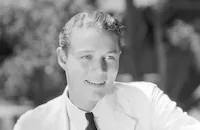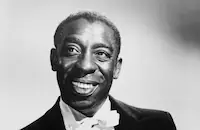Johnny Come Lately
Cast & Crew
William K. Howard
James Cagney
Miss Grace George
Marjorie Main
Marjorie Lord
Hattie Mcdaniel
Film Details
Technical Specs

Synopsis
Vinnie McLeod, a wealthy small-town matron, has been publishing the Plattsville Shield and Banner newspaper, whose motto is "A Shield for the Oppressed, a Banner for the Brave," since her husband's death thirty years earlier. In 1906, Vinnie still fervently believes in maintaining the integrity and freedom that typifies life in Plattsville, and furnishes the basement of her mansion, which was built by her husband and is known as "McLeod's Folly," with beds and has her housekeeper, Aida, supply food for homeless and hungry vagabonds. Vinnie has hit on hard times, however, and has been consigning her silver heirlooms for cash. One afternoon in the town park, she encounters drifter Tom Richards reading Charles Dickens' novel The Pickwick Papers . She is delighted to find another lover of literature, but advises Tom to seek shelter at her house to avoid being arrested for vagrancy. When Vinnie goes to the courthouse to gather information for her paper's crime report, she finds that Tom did not follow her advice. Tom pleads innocent and tries to prove that he is not a vagrant because he has two dollars in his pocket and walked all night rather than sleeping on public land. The judge is infuriated by Tom's quick wit, but Vinnie is delighted, and offers to hire the former newspaper reporter. The judge reluctantly agrees and places Tom in Vinnie's custody for two months' probation. Tom, who refuses to accept pay from Vinnie, soon learns that she is fighting a losing battle against the corruption of Bill Dougherty, a leading citizen and contractor who is running for office. In spite of Dougherty's threats, Vinnie refuses to print articles he has written in support of his campaign. On his own initiative, Tom confronts Dougherty, who calls him a "Johnny Come Lately" and threatens his life. Tom immediately returns to Vinnie with the articles and proposes a plan to combat Dougherty. Vinnie appoints Tom managing editor of her small staff, which includes her niece Jane, the society reporter who is in love with Dougherty's honest son Pete, and Willie Ferguson, a tippler who has been the sole reporter for the paper for thirty years. Tom closes the paper for three days, during which time he completely revamps the format. The new paper publishes Dougherty's articles but includes a disclaimer advising the readers of the "lies contained therein." The aggressive campaign succeeds in scaring Dougherty, who attempts to hire Tom to work for his newspaper. Tom next tries to rally the community against Dougherty, but the people he approaches, including Gashouse Mary, who pays protection money to Dougherty so that her social club will not be shut down, and Bill Swain, a Democratic leader in the state capital who garners most of his votes from Dougherty, cannot afford to alienate the powerful contractor. Dougherty continues to fight dirty, and has the mortgages on Vinnie's home and newspaper transferred to him. When Vinnie and Tom are shot at in her front yard by Dudley Hirsh, an ex-convict and Dougherty's campaign manager, Tom chases Hirsh and his henchman and throws them both from their wagon. After Tom publishes news of the assault and reports that Vinnie's hand was wounded, the citizens form a reform committee and appoint Tom to be the leader. Gashouse Mary offers her support, but when she heckles Dougherty, he has her arrested for disturbing the peace. Swain is so outraged that Gashouse Mary, who is his former girl friend, is in jail that he has her freed and pledges his full support to the reform cause. That night, an angry crowd assembles and parades past Dougherty's house, brandishing a hanging effigy of the candidate. Pete, who has always been ignorant of his father's corruption and who has tried in vain to assure Jane of his sincere love, challenges Tom to a fistfight. Although he is beaten by Tom, Pete regains Jane's love and loyalty. Dougherty demands Tom's arrest, but when a mob led by Gashouse Mary storms the jail, the police free Tom and desert the jail. Dougherty, out of consideration to his son, finally gives in to the pressure and agrees to retire and move to Florida. Before he leaves, he expresses his admiration for Vinnie, and cancels her mortgages. Peace and integrity are restored to Plattsville, and Tom, hearing the call of the train whistle, hops the next freight car out of town.

Director

William K. Howard
Cast

James Cagney
Miss Grace George

Marjorie Main

Marjorie Lord

Hattie Mcdaniel
Edward Mcnamara

Bill Henry

Robert Barrat
George Cleveland

Margaret Hamilton
Norman Willis

Lucien Littlefield
Edwin Stanley

Irving Bacon
Tom Dugan

Charles Irwin
John Sheehan

Clarence Muse
John Miller

Arthur Hunnicutt
Victor Kilian
Wee Willie Davis
Crew

Film Details
Technical Specs

Award Nominations
Best Score
Quotes
Trivia
Notes
The working title of this film was McLeod's Folly. According to a news item in Los Angeles Examiner, Louis Bromfield's novel McLeod's Folly was originally serialized in Cosmopolitan magazine as You Get What You Give. Hollywood Reporter news items reported that Bell Pictures Corp. bought the film rights to McLeod's Folly in 1940 for an independent production, and also that producer Jack Forrester optioned the novel in 1941 for a possible film project. A news item in Film Daily noted that Agnes Christine Johnston was originally slated to write the screenplay, but her contribution to the final film has not been determined. According to Hollywood Reporter news items, Alfred Henry Hall was cast in the film, but died on the set prior to shooting a scene, and does not appear in the film.
Johnny Come Lately marks stage actress Grace George's feature film debut and was the first film produced by Cagney Productions, Inc., a company formed by actor James Cagney and his brother William. Leigh Harline was nominated for an Academy Award in the category of Best Music (Scoring of a Dramatic or Comedy Picture).












